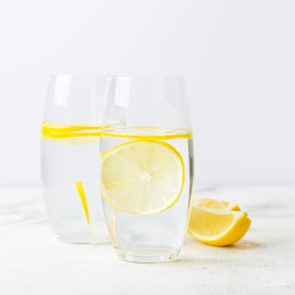Can You Drink Protein Shakes While Fasting?
Updated: Mar. 23, 2021
While intermittent fasting, you're supposed to consume just liquids during certain periods of time. However, when it comes to protein shakes, it can be tricky. Here's what registered dietitians want you to know about consuming protein shakes during a fast.
Intermittent fasting and protein shakes
Fasting isn’t exactly a new concept, but intermittent fasting for weight loss certainly is. According to a 2020 survey from the International Food Information Council, intermittent fasting is the most popular diet of 2020.
“There are a variety of ways to use intermittent fasting to achieve a wellness goal,” says Autumn Bates, a certified clinical nutritionist in Manhattan Beach, California. “Some might use a pure water fast for specific therapeutic purposes. However, many people also like to use drinks during their fasting period to keep them satiated.”
To keep insulin production flipped off and what’s known as the migrating motor complex (a mechanism in the body that helps aid digestion) on, drink only calorie-free beverages during fasting windows.
What about when it comes to drinking protein shakes? Can you have a protein shake while intermittent fasting? Yes and no. “Protein shakes contain amino acids that cause insulin levels to spike and therefore will break a fast,” Bates says. However, they can still be part of your intermittent fasting schedule, if done during the appropriate window. (More on this later.)
When fasting, to understand the types of drinks you can consume and when, you need to know what exactly is fasting and the intermittent fasting schedule you choose to follow.

What is intermittent fasting?
Unlike most eating plans that dictate what to eat (like, say, Whole30 or the keto diet), intermittent fasting is an eating plan that determines when you do and don’t eat.
The most common intermittent fasting schedules include:
-
Time-Restricted Eating. Arguably the easiest to follow of all intermittent fasting plans, time-restricted eating involves eating within a particular window of time each day. This generally takes the form of the 16:8 method, (fast for 16 hours and eat as desired within the next eight hours) or the 14:10 method (fast for 14 hours and eat as desired within the next 10 hours).
-
Alternate-Day Fasting. Consume 500 calories every other day. Eat normally on the alternate days.
-
Eat Stop Eat. Fast for 24 hours once or twice a week. On the other days, eat as desired.
-
5:2 Fasting. Eat as desired for five days of the week and fast for two non-consecutive days (say, Tuesday and Friday).
-
The Warrior Diet. Consume all of your desired calories within a four-hour window each day.
Who should—and shouldn’t—try intermittent fasting
Some intermittent fasting methods are relatively flexible, allowing you to eat as many calories as you crave during your eating window. It has been found to offer some solid health benefits (those include helping to stave off type 2 diabetes among those at risk, delay aging, and prevent cardiovascular disease). But that’s only if you can stick to it. A study published in 2020 in JAMA Internal Medicine, found that following the 16:8 method of intermittent fasting can lead to weight loss among those who are overweight and obese, but so can consistently-timed meals.
During fasting days or windows, though, the calorie range is usually between zero and 500 calories. You get to decide how to “spend” those calories on food and/or drink.
Keep in mind, fasting isn’t for everyone. It’s not suggested for:
-
Anyone with diabetes or a need to control blood sugar
-
Women who are pregnant, breastfeeding, or trying to get pregnant
-
People with a history of eating disorders or seizure disorders
As with any eating plan, check with your doctor or dietitian before starting an intermittent fasting plan.
Can you drink protein shakes while intermittent fasting?
Feel free to sip on protein shakes while intermittent fasting, but only during your eating window. Otherwise, you’ll break your fast. For that matter, any food or drink that has calories will break your fast, leading to insulin production that kicks the body out of the desired anti-aging “autophagy” and fat-burning “ketosis” phases.
“Many protein shakes have hundreds of calories and can almost be considered a meal replacement or snack,” says Katherine Brooking, RD, a registered dietitian and co-founder of the nutrition news company Appetite for Health in San Francisco.
Keep in mind that protein powder (even just mixed with plain water) has calories and macronutrients. There are other supplements that are less likely to break a fast and may be possible to consume during your fasting window. Those include: multivitamins, fish oil supplements, individual vitamins or minerals, prebiotics, and probiotics.
How much protein do you need while intermittent fasting?
The recommended minimum dietary reference intake of protein for a sedentary human is 0.8 grams of protein per kilogram, or 0.36 grams per pound, according to Harvard Medical School nutrition experts. For a 150-pound person, this works out to about 54 grams of protein per day (about ½ cup chopped chicken breast, two eggs, and one cup of Greek yogurt). Those who weigh more or are more active will likely need more protein. Some people, like older adults, may need more.
The body can absorb up to about 25 grams of protein at one meal or snack, according to a review of studies published in 2018 in the Journal of International Society of Sports Nutrition.
Since some following an intermittent fasting plan restrict calories drastically or may not prioritize high-quality, well-balanced foods, fasting has been linked to potential muscle loss. This makes it important to keep tabs on your overall protein intake during your eating window. The protein need not be through beverages, though.
The final word on intermittent fasting and drinking protein shakes
Beverages with calories need to be tracked, says Julie Upton, RD, a registered dietitian and co-founder of the nutrition news company Appetite for Health, no matter if it’s rich in protein, fat, or carbs.
“Protein shakes contain calories and will trigger an insulin response, kicking the body out of a fasted state,” says Leigh Merotto, RD, a Toronto-based registered dietitian with a focus on metabolic health, digestion/gut health, and sports nutrition. “They can be a good way to break a fast as protein is very satiating, and may help as a quick recovery drink for those who work out in the mornings before ending their fast.”
Protein shakes are a convenient source of fuel, but can be loaded with sugar or artificial sweeteners. If you do choose a protein shake during your eating period, read the label carefully and check the ingredient list and nutrition facts panel.
For best muscle-building and appetite-taming results, mix up your protein sources and spread them out as evenly as possible during eating windows. If you’re intermittent fasting for weight loss and are seeking a satisfying meal plan, high-protein foods like fish, legumes, poultry, pork, or tofu might be a better fit than shakes alone.





















